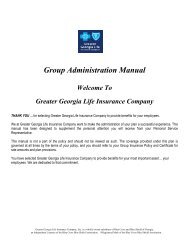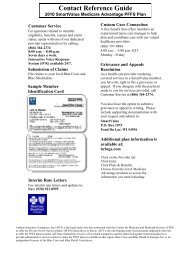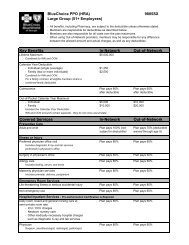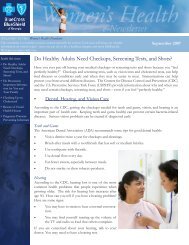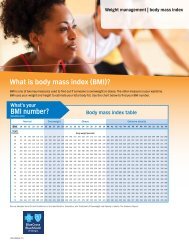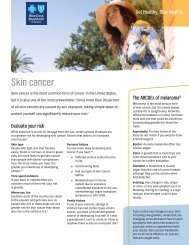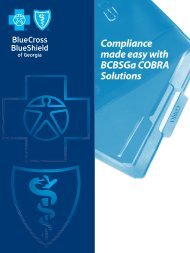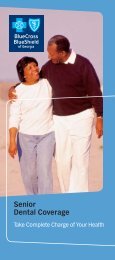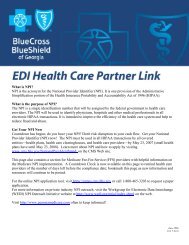What Every Woman Should Know About Cervical Cancer
What Every Woman Should Know About Cervical Cancer
What Every Woman Should Know About Cervical Cancer
You also want an ePaper? Increase the reach of your titles
YUMPU automatically turns print PDFs into web optimized ePapers that Google loves.
WELCOME TO THE Women’s Health eNewsletterThis newsletter is a monthly resource created especially for women. Each issue will bring you valuableinformation on various topics - news you can use to live a healthier, happier, and more fulfilling life.We hope you enjoy each issue.January 2008Inside this issue:• <strong>What</strong> <strong>Every</strong> <strong>Woman</strong><strong>Should</strong> <strong>Know</strong> <strong>About</strong><strong>Cervical</strong> <strong>Cancer</strong>• Pregnancy Tips -A to Z• Happy New Year!A Healthy Way toStart 2008• Pregnancy Pointers:Taking MedicationDuring Pregnancy<strong>What</strong> <strong>Every</strong> <strong>Woman</strong> <strong>Should</strong> <strong>Know</strong> <strong>About</strong> <strong>Cervical</strong> <strong>Cancer</strong>The American <strong>Cancer</strong> Society predicted 11,150 new cases of invasive cervical cancer would be foundin the United States in 2007. Although this number appears large, the number of deaths from cervicalcancer has declined significantly. In fact, the death rate from cervical cancer continues to decline bynearly 4% a year. The main reason for this change is the use of the Pap test to find cervical cancerearly. This screening procedure can find changes in the cervix before cancer develops and earlycancer in its most curable stage. It is essential that women continue to receive these tests for the incidencerates to proceed in the right direction, downward.January is <strong>Cervical</strong> <strong>Cancer</strong> Awareness Month making it an ideal time to remind and educate womenabout the importance of screening and early detection. If you are not already following the screeningguidelines it is time to start and if you are diligent about your exams take this occasion to encouragea friend, family member, or colleague to do the same. It can be a lifesaving opportunity.<strong>What</strong> is <strong>Cervical</strong> <strong>Cancer</strong>?The cervix is the lower part of the uterus (womb). The cervix connects the body of the uterus tothe vagina, or birth canal.<strong>Cervical</strong> cancer is the uncontrolled growth of severely abnormal cells on the cervix. This cancermay not form suddenly with some cells changing from normal to pre-cancer and then to cancer. Insome cases this may take a number of years to develop while others may be more rapid. There aretwo main types of cervical cancer: squamous cell cervical cancer and adenocarcinoma cervical cancer.<strong>About</strong> 80-90% of all cervical cancers are squamous cell. Fortunately, when detected at an early stage,cervical cancer is highly curable and not every woman who has precancerous changes in the cells ofher cervix will develop cervical cancer.<strong>What</strong> are the Signs?According to the American <strong>Cancer</strong> Society (ACS), earlycervical pre-cancers or cancers often show no signs orsymptoms and are virtually undetectable unless a womanhas a pelvic exam and a Pap test. Symptoms usuallyappear when the cancer has advanced and has invadedsurrounding tissue. Any of the following symptomsshould be reported to your doctor as soon as possible:any unusual discharge from the vagina (not your normalperiod); blood spots or light bleeding other than yournormal period; or bleeding or pain after sex, douching, orafter a pelvic exam. These symptoms may be related to acause other than cervical cancer and should be examinedby your doctor.
Risk FactorsSeveral risk factors, both controllable and uncontrollable, increase a woman’s chance of getting cervical cancer. TheACS lists the following factors related to cervical cancer:• The most important risk factor is infection with HPV (human papilloma virus). Even though HPV is animportant risk factor for cervical cancer, most women with this infection do not get cervical cancer. There isno cure or treatment for HPV, but in some cases it goes away on its own without any treatment. There is alsonow an HPV vaccine (Gardasil) which has been approved by the Food and Drug Administration (FDA). TheAdvisory Committee on Immunization Practices (ACIP) recommends that three doses of the new vaccineshould be administered to girls when they are 11 or 12 years old. However, the vaccination series can bestarted as early as nine years old at the discretion of the physician or health care provider. The recommendationalso includes girls and women 13-26 years old because they will benefit from getting the vaccine.• Women who smoke are almost twice as likely to get cervical cancer. Tobacco smoke can produce chemicalsthat may damage the DNA in cells of the cervix and make cancer more likely to occur.• Women whose immune systems are weakened by the human immunodeficiency virus (HIV), which causesAIDS, and organ transplant patients who receive drugs to prevent rejection of the new organ.• Some studies show that women who have (or have had in the past) the chlamydia infection may be at increasedrisk for developing cervical cancer. Chlamydia is a rather common kind of bacteria that can infectwomen’s sex organs and is spread during sex. Many women with this infection do not know they have it. Adoctor can take samples at the time of their Pap test to look for the bacteria.• Women who are overweight are at increased risk for cervical cancer. A decreased intake of fruits and vegetableshas also been associated with increased risk.• Women who use oral contraceptives. Long-term use of birth control pills increases the risk of this cancer.Some studies show a higher risk after 5 or more years of use.• <strong>Woman</strong> who have had many full-term pregnancies have an increased risk of this cancer. No direct reasonhas been attributed to this reason for increased risk however numerous large studies have concluded this tobe true.• Women whose mothers took the drug diethylstilbestrol (DES) during pregnancy to help avoid miscarriage.DES was used for this purpose from 1940 to 1970.• Recent studies suggest that women whose mother or sister has had cervical cancer are more likely to get thedisease themselves. This could be because they are less able to fight off HPV than other women, or otherfactors could be involved.Steps towards PreventionStart your New Year off right, by taking care of yourself. The following women should be screened to help detectand prevent cervical cancer:• Women who are 21 years of age or younger if sexually active, annually.• Women ages 30 and older with negative results on 3 consecutive Pap tests, every 2 to 3 years.• Women 70 years or older who have had 3 or more normal Pap tests and no abnormal Pap test in the last 10years and women who have had a total hysterectomy may choose to stop cervical cancer screening.• Women at high risk may require more frequent pap tests.The most important thing you can do for yourself is to get regular exams and talk with your physician todetermine how often to have a Pap test and or chlamydia screening. The most important thing you can dofor the other women in your life is to encourage them to do the same.
The information provided here is for educational purposes only and is not the practice of medicine nor a substitutefor sound medical advice. If you have any questions or concerns you should contact your physician.Pregnancy Tips from A to ZThe New Year is a little bit like a baby. Both arefull of possibilities and potential. So if you havea newborn on the way or are thinking aboutstarting a family, this is the time to take advantageof the many things you can do to help yourbaby have a healthy start in life.Many birth defects happen very early in pregnancy,sometimes before a woman even knowsshe is pregnant. And not all birth defects can beprevented. According to the Centers for DiseaseControl (CDC) and the March of Dimes, awoman can take some actions that increase herchance of having a healthy baby.Remember your ABC’s...ABCDEFAvoid exposure to toxic substances and chemicals - such as cleaning solvents, lead and mercury, someinsecticides and paint. Pregnant women should avoid exposure to paint fumes.Be sure to see your doctor and get prenatal care as soon as you think you’re pregnant. It’s important tosee your doctor regularly throughout pregnancy, so be sure to keep all your prenatal care appointments.Cigarette smoking during pregnancy can result in low birth weight babies. It’s been associated withinfertility, miscarriages, tubal pregnancies, infant mortality and childhood morbidity. Additionally, cigarettesmoking may cause long-term learning disabilities. If you smoke, you should try to quit. Secondary smokemay also harm a mother and her developing baby. It’s a good idea to ask people to stop smoking around youduring your pregnancy and after the baby is born.Drink extra fluids (water is best) throughout pregnancy to help your body keep up with the increases inyour blood volume. Drink at least 6 to 8 glasses of water, 100% fruit juice or milk each day. A good way toknow you’re drinking enough fluid is when your urine looks like almost-clear water or is very light yellow.Eat healthy to get the nutrients you and your unborn baby need. Each day you should get the following:6-11 servings of grain products, 3-5 servings of vegetables, 2-4 servings of fruits, 4-6 servings of milk andmilk products, 3-4 servings of meat and protein foods. Foods low in fat and high in fiber are important to ahealthy diet.Take 400 micrograms of folic acid daily both before pregnancy and at least 600 micrograms duringpregnancy to reduce the risk of birth defects of the brain and spine. All women who could possiblybecome pregnant should take a vitamin with folic acid, every day. It’s also important to eat a healthy diet,including foods fortified with folic acid (enriched grain products, including cereals, rice, breads and pastas)and foods with natural sources of folate (orange juice, dark green leafy vegetables, beans, peanuts, broccoli,asparagus, peas and lentils).
GHIJKLMNOPQRGenetic testing should be done appropriately. It’s important to know your family history. If there have beenproblems with pregnancies or birth defects in your family, report these to your doctor. Also, genetic counselorscan talk with you about the information you might need in making decisions about having a family. Youcan call a major medical center in your area for help in finding a board-certified genetic counselor.Hand-washing is important throughout the day, especially after handling raw meat or using the bathroom. Thiscan help prevent the spread of many bacteria and viruses that cause infection.Increase your iron intake. Iron deficiency affects half of all pregnant women. The recommended amountof iron you need each day increases during pregnancy from about 18 milligrams (mg) per day to 27 mg perday. Most pregnant women get this amount from eating foods that contain iron (dark green leafy vegetables,iron-fortified cereals, whole grains, dried fruits, legumes) and taking prenatal vitamins that contain iron.Some women need to take iron supplements to prevent iron deficiency.Join a support group for moms-to-be, or join a class on parenting or childbirth.<strong>Know</strong> your limits. Let your physician know if you experience any of the following: pain of any kind, strongcramps, uterine contractions at 20-minute intervals, vaginal bleeding, leaking of amniotic fluid, dizziness,fainting, shortness of breath, palpitations, tachycardia (rapid beating of the heart), constant nausea and vomiting,trouble walking, edema (swelling of joints) or if your baby has decreased activity.Legal drugs such as alcohol and caffeine are important issues for pregnant women. There is noknown safe amount of alcohol a woman can drink while pregnant. Fetal alcohol syndrome, a disorder characterizedby growth retardation, facial abnormalities, and central nervous system dysfunction, is caused by awoman’s use of alcohol during pregnancy. Caffeine, found in tea, coffee, soft drinks and chocolate, shouldalso be limited. Be sure to read labels when trying to cut down on caffeine during pregnancy. More than 200foods, beverages and over-the-counter medications contain caffeine!Medical conditions/complications such as diabetes, epilepsy and high blood pressure should be treatedand kept under control. Ask your doctor about any medications that may need to be changed or adjustedduring pregnancy. If you are currently taking any medications ask your doctor if it is safe to take them whileyou’re pregnant. Also, be sure to discuss any herbs or vitamins you are taking. They are considered medications,too! Discuss with your doctor all medications, prescribed and over-the-counter, that you are taking.Now is the time to baby-proof your home. Make your home a safer environment for your baby!Over-the-counter cough and cold remedies may contain alcohol or other ingredients that should be avoidedduring pregnancy. Ask your health care provider about prescription or over-the-counter drugs that youare taking or may consider taking while pregnant.Physical activity during pregnancy can benefit both you and your baby by lessening discomfort andfatigue, providing a sense of well-being, and increasing the likelihood of early recovery after delivery. Lightto moderate exercise during pregnancy strengthens the abdominal and back muscles, which help to improveposture. Practicing yoga, walking, swimming and cycling on a stationary bicycle are usually safe exercises forpregnant women. But always check with your doctor before beginning any kind of exercise, especially duringpregnancy.Queasiness, stomach upset and morning sickness are common during pregnancy. Foods that you normallylove may make you feel sick to your stomach. You may need to substitute other nutritious foods. Eatingfive or six small meals a day instead of three large ones may make you feel better.Rodents may carry lymphocytic choriomeningitis virus (LCMV). If a pregnant woman is infected with LCMV,it can pass to the unborn baby and cause severe abnormalities or loss of the pregnancy. Avoid all contactwith rodents, including pet hamsters and guinea pigs, and with their urine, droppings and nesting materialsthroughout pregnancy. Mice in the home should be removed promptly by a professional pest controlcompany or another member of the household. Pet rodents should be housed in a separate part of the housewhere other household members or friends can care for the pet and clean its cage.
• Omit 100 empty calories from your diet today. That is just 2 cookies, 1 slice of bread or 8 ounces of fruitjuice. Over the course of this year that would result in over a 10 pound weight loss!Healthy Fitness Tips• Do some crunches, leg lifts, squats, or arm curls while watching TV or as mini-fitness breaks throughout theday.• Avoid an exercise rut by varying your exercise! Take new classes, try different forms of cardio routines, and/or use different pieces of equipment at the gym.• Take the stairs, park farther away, take a walk during your lunch break – squeeze fitness in any way you can!• Pick a time each day that you only use for activity (early morning, lunch hour, or after work). Schedule exercisein your day, as you would any other important appointment or meeting.• Keep comfortable walking shoes or gym clothes in your car or at work, so you are ready to go.• Get support from your family, co-workers, and friends. Exercise together.• Even household chores or leisure activities add up – for a 150lb person, shoveling snow for 30 minutes burnsover 200 calories, and dancing for 30 minutes adds up to over 150 calories!Visit www.mypyramid.gov for more tips on healthy eating and exercise. Remember those small, measurable goals canadd up to long-term success, as long as you stick with them all year long. Here’s to a happy and healthy new year forall!
Pregnancy Pointers:Taking Medications During PregnancyWith cold and flu season in full swing, some people find relief with over-the-counter medications.While some medications are considered safe to take during pregnancy, the effects of other medicationson your unborn baby are unknown. Therefore, it is very important to pay special attention tomedications you take while you are pregnant, especially during the first trimester, a crucial time ofdevelopment for your baby. Before you try an over-the counter product, discuss its use with yourhealth care provider.If you were taking prescription medications before you became pregnant, please ask your healthcare provider about the safety of continuing these medications as soon as you find out that you arepregnant. Your physician will weigh the benefit to you and the risk to your baby when making his or herrecommendation about a particular medication. With some medications, the risk of not taking them maybe more serious than the potential risk associated with taking them.Important News!Blue Cross and Blue Shield of Georgia announcesFuture Moms, a prenatal education programdesigned to help you have a healthy pregnancy and a healthy baby.Please call 800-814-1508 or contact yourcustomer service representative for more information.Smoking FactsDid you know……Cigarette smoking was rare among women in the early 20th century and became prevalentamong women after it did among men. According to the 2006 data from the Centers for Disease Control (CDC),approximately 18% of women in the United States smoked. Although fewer women smoke than men, the percentagedifference between the two has continued to decrease year to year. Today, with a much closer gap between men’s andwomen’s smoking rates, women share a much larger burden of smoking-related diseases.• In 2007, an estimated 70,880 women will have died of lung and bronchus cancer.• Women who smoke double their risk for developing coronary heart disease.• Cigarette smoking has many adverse reproductive and early childhood effects, including an increasedrisk for infertility, preterm delivery, stillbirth, low birth weight, and sudden infant deathsyndrome (SIDS).• Postmenopausal women who smoke have lower bone density than women who never smoked.Women who smoke have an increased risk for hip fractures than non-smokers.Source: American Lung AssociationFor information to help you quit smoking, please visit the following website: www.smokefree.gov,or call the National Network of Tobacco Cessation Quitlines at 1-800-QUITNOW (1-800-784-8669)TTY 1-800-332-8615.
This information is intended for educational purposes only, and should not be interpreted as medical advice.Please consult your doctor for advice about changes that may affect your health. Trade names of commonly usedmedications and devices are provided for ease of education but are not intended as particular endorsements.Your doctor may choose to use items not represented here. Some services may not be covered under your healthplan. Please refer to your Health Plan Group Certificate and Schedule of Benefits for details concerningbenefits, procedures, and exclusions. This newsletter and your health plan company are not affiliated with orresponsible for information provided by resources cited in the articles.Women’s Health e-NewsletterManaging EditorMelissa Buczek, MS,RD, CDNDesign CoordinatorRhonda WolberdContributorsMelissa Buczek, MS,RD, CDNJune Levine, RD, CDN, CDEMarketing CoordinatorJason KinzyPhysician ReviewerLora Abell, MDFor more information about Women’s Health or other products and services offered by Blue Cross and Blue Shieldof Georgia, visit our Web site at http://w3.bcbsga.com/healthyLiving/womensHealth/.To UNSUBSCRIBE from this mail list, simply click on the link below and then click send.WH_BCBSGA-SIGNOFF-REQUEST@LIST.BCBSGA.COMPlease Note: Unless otherwise stated in the linked Web sites, the entities delivering the referenced linked Web sitesare not affiliates of Blue Cross and Blue Shield of Georgia. Blue Cross and Blue Shield of Georgia exerts no controlover the linked Web sites and assumes no responsibility for any information or other content located on thelinked Web sites, or any subsequently linked Web sites. Blue Cross and Blue Shield of Georgia makes no endorsementof the entities sponsoring the linked Web sites.Blue Cross Blue Shield of Georgia is an independent licensee of the Blue Cross and Blue Shield Association.



